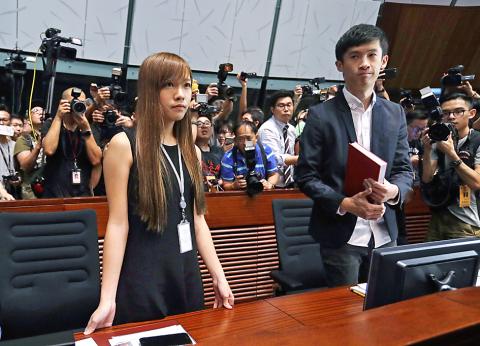Two newly elected pro-democracy lawmakers yesterday defied an order barring them from taking their oaths after being disqualified earlier for insulting China, sparking more unruly scenes in Hong Kong’s legislature.
After Yau Wai-ching (游蕙禎) and Sixtus “Baggio” Leung (梁頌恆) of the Youngspiration party entered the Legislative Council’s main chamber, the body’s president ordered them to leave, but the two refused.
Half a dozen other pro-democracy lawmakers surrounded them at their desks to block security guards trying to remove them.

Photo: AP
After half an hour, the session was adjourned until next week.
At a swearing-in ceremony two weeks ago, Yau, 25, and Leung, 30, modified their oaths in an act of defiance by using a derogatory word for China.
Yau also slipped in an expletive.
The two were part of a new wave of young pro-democracy legislators elected last month amid a rising tide of anti-China sentiment, with many Hong Kong residents concerned about Beijing eroding the territory’s wide autonomy.
Legislative Council President Andrew Leung (梁智鴻) has barred the pair from taking their oaths until a court rules next month on a legal challenge filed by Hong Kong’s government, which wants to stop them from taking office.
Yau yesterday criticized Andrew Leung, telling reporters that he used “a reason without any legal base” to prevent the pair from being sworn in.
New lawmaker Nathan Law (羅冠聰), who advocates self-determination for Hong Kong, said that while he might not endorse the pair’s behavior when they first took their oaths, they should be allowed to sit as elected lawmakers.
“What we are trying to protect is people’s rights to vote, and Hong Kong’s legislative system,” Law told reporters.
Andrew Leung said on Tuesday night that he would defer Baggio Leung and Yau’s oath-taking until the judicial review is complete — it is due to start on Nov. 3, but could last months.
Until that time they would not be able to enter the chamber, he said.
“This decision is painful but necessary. If I did not make it, Legco would stop functioning,” he told reporters.
Outside the building, thousands of pro-Beijing supporters waved China’s national flag and called Yau and Baggio Leung “scum,” holding up photographs of them pierced with darts.
Last week’s session ended abruptly when the council’s contingent of pro-Beijing lawmakers sparked chaos by walking out of the chamber moments before Yau and Baggio Leung were set to retake their oaths, depriving the session of a quorum.

CHAOS: Iranians took to the streets playing celebratory music after reports of Khamenei’s death on Saturday, while mourners also gathered in Tehran yesterday Iranian Supreme Leader Ayatollah Ali Khamenei was killed in a major attack on Iran launched by Israel and the US, throwing the future of the Islamic republic into doubt and raising the risk of regional instability. Iranian state television and the state-run IRNA news agency announced the 86-year-old’s death early yesterday. US President Donald Trump said it gave Iranians their “greatest chance” to “take back” their country. The announcements came after a joint US and Israeli aerial bombardment that targeted Iranian military and governmental sites. Trump said the “heavy and pinpoint bombing” would continue through the week or as long

TRUST: The KMT said it respected the US’ timing and considerations, and hoped it would continue to honor its commitments to helping Taiwan bolster its defenses and deterrence US President Donald Trump is delaying a multibillion-dollar arms sale to Taiwan to ensure his visit to Beijing is successful, a New York Times report said. The weapons sales package has stalled in the US Department of State, the report said, citing US officials it did not identify. The White House has told agencies not to push forward ahead of Trump’s meeting with Chinese President Xi Jinping (習近平), it said. The two last month held a phone call to discuss trade and geopolitical flashpoints ahead of the summit. Xi raised the Taiwan issue and urged the US to handle arms sales to

State-run CPC Corp, Taiwan (CPC, 台灣中油) yesterday said that it had confirmed on Saturday night with its liquefied natural gas (LNG) and crude oil suppliers that shipments are proceeding as scheduled and that domestic supplies remain unaffected. The CPC yesterday announced the gasoline and diesel prices will rise by NT$0.2 and NT$0.4 per liter, respectively, starting Monday, citing Middle East tensions and blizzards in the eastern United States. CPC also iterated it has been reducing the proportion of crude oil imports from the Middle East and diversifying its supply sources in the past few years in response to geopolitical risks, expanding

Pro-democracy media tycoon Jimmy Lai’s (黎智英) fraud conviction and prison sentence were yesterday overturned by a Hong Kong court, in a surprise legal decision that comes soon after Lai was jailed for 20 years on a separate national security charge. Judges Jeremy Poon (潘兆初), Anthea Pang (彭寶琴) and Derek Pang (彭偉昌) said in the judgement that they allowed the appeal from Lai, and another defendant in the case, to proceed, as a lower court judge had “erred.” “The Court of Appeal gave them leave to appeal against their conviction, allowed their appeals, quashed the convictions and set aside the sentences,” the judges